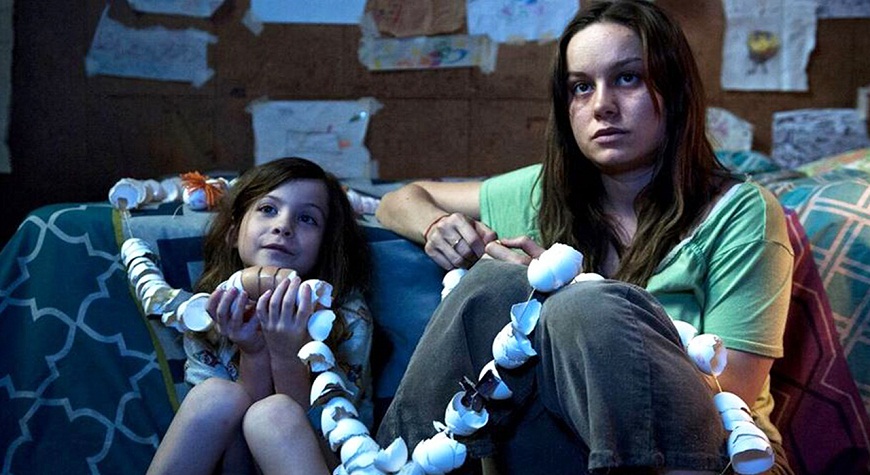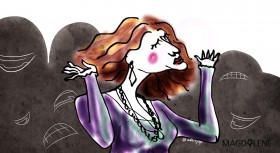There are many horrible things that people experience in war, disease and pestilence, poverty, oppression and discrimination, and daily alienation. Many novels, poems, art works and films explore or are set against these conditions. Though it is impossible to fully understand what it means to experience them, their depictions in the arts, literature and pop culture make them more imaginable.
Then there is a story like Room, a film by Lenny Abrahamson based on Emma Donoghue’s novel about the harrowing life of a young woman and her child, which is beyond the imagination of any normal person. A 17 year old young woman, Joy (Brie Larson) is kidnapped by a man and made prisoner in a tiny shed for seven years, during which she was raped almost every night. After two years in captivity, she gives birth to a boy, whom she raises in the room for the next five years.
For the young child, Jack (Jacob Tremblay), the room is his whole existence, extending all the way in all directions. He watches TV, but is told by his mother initially that everything he watches is not real. But for his mother the room is a real prison with its nightly horror of being raped by “old Nick” (played by Sean Bridgers), a 40 something year old man, in a shed soundproofed from the world outside.
The film’s great accomplishment is that it makes this unimaginable experience accessible. It leaves what can only have been the most horrific part of the experience – the initial imprisonment, the first realization that she won’t be released, the rapes and violence in those early days, her two years being completely alone before Jack was born – to the imagination of the viewers.
The imprisonment and violence that we see in the first part of the film is that of a woman who asserts “mind over matter”, as Jack quotes her oft-repeated advice, domesticating the imprisonment and seeking refuge in the humanity of her loving relationship with her son.
Larson and Tremblay’s portrayal of the two captives – one aware of their imprisonment, the other oblivious to it (at first) – allows us into a world that may otherwise be too hard to imagine. Larson’s Oscar for best actress for this film was much deserved.
But starting the story five years into the imprisonment also allows Room to speak metaphorically of what thousands of women experience: being trapped in an abusive relationship that they feel they can’t escape. Old Nick, the “husband”, provides the mother and son their basic material needs, but, as Joy tells an idiot TV interviewer after their escape: “There was no relationship…Jack has no father”. For Old Nick, Joy is nothing but an object that allows him to sexually gratify himself in violent and cruel manners – basically just masturbating himself inside her.
The trust between them enables Jack to do the fantastic thing necessary to escape, and the skills he has from his “room” existence leads to the discovery of the shed. Hence Joy’s escape.
The second half of the film deals with how these survivors live in the outside world. Back in the room, outside was freedom, and, of course, it is. Neither wants to ever close the door and be inside a locked room again. But the outside world is not without its imprisonments either.
The outside world finds it hard to understand the psychic and inner struggle of a woman who has suffered the violent horrors that Joy has suffered: years of repeated rapes in a violent imprisonment, isolated with a robot-like tormentor, made pregnant by him, all the while caring and raising her baby.
The media seizes on the incident for sensationalized reporting, with almost no empathy for the victim. A TV journalist asks idiotic questions like: “Did you ever consider killing yourself?” Or worse: “Why didn’t you ask the man to take the new born baby and leave it anonymously at a hospital? Wouldn’t that have been better for the baby?”
A mother, so goes the assumption, is only allowed to think of her child, never of herself, even in a survival situation. In any case: let her baby out of her sight by handing it to a rapist who has proved himself cruel and inhumane?
And Joy’s parents? Her father cannot bring himself to look at or talk to Jack. Somehow the victims are to blame and wear the stigma.
Joy is reminded of her life before imprisonment, when she was a “nice girl” along with the other nice teenage friends to whom “nothing happened”. She feels the loss of the nice-ness, but blames her nice upbringing as well.
“Maybe if you hadn’t taught me to Be Nice! I wouldn’t have stopped to help the man who said his dog was sick,” she explodes to her mother. “I am sorry, I am not nice anymore!”
The internal struggle of a sexual violence victim comes in stages. Both her soul and mind must deal with the darkness of the experience alone. She must walk the dark alleys alone, cold and frightened. It is a new struggle to survive, to heal her wounds.
At the same time, she must also help heal Jack’s wounds. Jack is a product of her relationship with her own inner struggles to survive. It is Jack and her relationship with him that has given her resilience. They give each other strength and are each other’s companions. They unite in their darkness and seek the “light” they need to deal with the darkness of the violence and evil they have experienced.
Room helps me learn about inner struggle and understand the depth, distance, darkness and coldness of being a survivor in a world still marked by violence and injustice. It reveals as well the inability of many to empathize with those whose experiences are near unimaginable – in this case the horror of being imprisoned, suffering daily abuses, with almost no hope of escaping.
*Illustration by canburak
Faiza Mardzoeki is a playwright, a theater producer and the Director of Institut Ungu. Follow @faizamarzd on Twitter and visit her webpage www.faizamardzoeki.com.








Comments